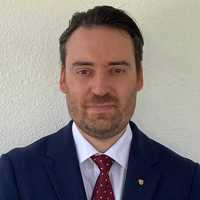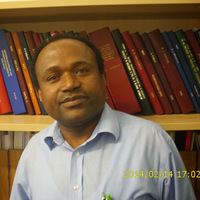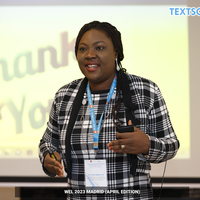
Rui Alexandre Castanho
Rui Alexandre Castanho
holds an International Ph.D. on Sustainable Planning in Borderlands. Nowadays, he is a Vice-Dean for Sustainable Development at the WSB University, Poland, and a visitor Professor at the University of Johannesburg, South Africa. He is an European Climate Pact Ambassador. Besides, he completed a post-doc researcher on the GREAT Project, University of Azores, Ponta Delgada, Portugal. Furthermore, he collaborates with the ECIDES Research Group - University International of La Rioja (UNIR), Spain; Vice-Coordinator of VALORIZA - Research Center for the Enhancement of Endogenous Resources, Polytechnic Institute of Portalegre (IPP), Portugal; CITUR - Madeira - Centre for Tourism Research, Development and Innovation, Madeira, Portugal (Researcher); and AQUAGEO Research Group - University of Campinas (UNICAMP), Brazil. Moreover, he has Graduated in Green Spaces Engineering and Agricultural Engineering and holds a Master's Degree in Planning, Audit, and Control in Urban Green Spaces. He is also the author and/or editor of 20 books, more than a 130 indexed peer review papers, 90 indexed book chapters, 90 conference papers, and made several presentations worldwide academic events as keynote speaker. Also, he was awarded the Doctor Honoris Causa title in Lima-Peru by (UPCI).
Phone: 00351 912494673
holds an International Ph.D. on Sustainable Planning in Borderlands. Nowadays, he is a Vice-Dean for Sustainable Development at the WSB University, Poland, and a visitor Professor at the University of Johannesburg, South Africa. He is an European Climate Pact Ambassador. Besides, he completed a post-doc researcher on the GREAT Project, University of Azores, Ponta Delgada, Portugal. Furthermore, he collaborates with the ECIDES Research Group - University International of La Rioja (UNIR), Spain; Vice-Coordinator of VALORIZA - Research Center for the Enhancement of Endogenous Resources, Polytechnic Institute of Portalegre (IPP), Portugal; CITUR - Madeira - Centre for Tourism Research, Development and Innovation, Madeira, Portugal (Researcher); and AQUAGEO Research Group - University of Campinas (UNICAMP), Brazil. Moreover, he has Graduated in Green Spaces Engineering and Agricultural Engineering and holds a Master's Degree in Planning, Audit, and Control in Urban Green Spaces. He is also the author and/or editor of 20 books, more than a 130 indexed peer review papers, 90 indexed book chapters, 90 conference papers, and made several presentations worldwide academic events as keynote speaker. Also, he was awarded the Doctor Honoris Causa title in Lima-Peru by (UPCI).
Phone: 00351 912494673
less
Related Authors
Lucius Botes
North-West University
Javier Jorge-Vázquez
Universidad Católica de Ávila
Dr. Godswill Osuma
Covenant University Canaanland, Ota.
José Manuel Jurado Almonte
Huelva University
Tinuade A Ojo (PhD)
University of Johanessburg
Marco Marsili
Università Ca' Foscari Venezia
InterestsView All (11)










Uploads
Papers by Rui Alexandre Castanho
This study focuses on Gauteng Province, South Africa, a region highly prone to inequality. Using data from 1993 to 2022 and applying the Method of Moments Quantile Regression (MMQR), the study reveals that digitalization significantly reduces inequality across Gauteng's regions. The Human Development Index (HDI) is negatively correlated with inequality, showing that improvements in human development help narrow disparities. However, regional output disparities intensify inequality, with the impact growing from lower to higher quantiles. These findings underscore the dual role of digitalization as both a means of reducing inequality and a marker of deeper economic and social divides. Given the limited research on digitalization and
inequality in developing economies, particularly in South Africa, this study offers critical insights and policy implications for fostering inclusive growth in the region.
Alpha, Composite Reliability (CR), Average Variance Extracted (AVE), the Heterotrait–Monotrait (HTMT) ratio, and the Fornell–Larcker test. Structural model analysis was conducted, examining R2, Q2, f2, beta coefficients, p-values, and t-statistics derived through bootstrapping. The results
reveal that management capabilities significantly enhance sustainable business performance. However, technological capabilities were not found to moderate the relationship between conceptual competency and sustainable business performance. Additionally, conceptual competency fully mediates the relationship between management capabilities and sustainable
business performance. The findings underscore the importance of fostering skills and competencies among women entrepreneurs in emerging economies to drive long-term business success. The study’s limitations and recommendations for future research are also discussed.
This study focuses on Gauteng Province, South Africa, a region highly prone to inequality. Using data from 1993 to 2022 and applying the Method of Moments Quantile Regression (MMQR), the study reveals that digitalization significantly reduces inequality across Gauteng's regions. The Human Development Index (HDI) is negatively correlated with inequality, showing that improvements in human development help narrow disparities. However, regional output disparities intensify inequality, with the impact growing from lower to higher quantiles. These findings underscore the dual role of digitalization as both a means of reducing inequality and a marker of deeper economic and social divides. Given the limited research on digitalization and
inequality in developing economies, particularly in South Africa, this study offers critical insights and policy implications for fostering inclusive growth in the region.
Alpha, Composite Reliability (CR), Average Variance Extracted (AVE), the Heterotrait–Monotrait (HTMT) ratio, and the Fornell–Larcker test. Structural model analysis was conducted, examining R2, Q2, f2, beta coefficients, p-values, and t-statistics derived through bootstrapping. The results
reveal that management capabilities significantly enhance sustainable business performance. However, technological capabilities were not found to moderate the relationship between conceptual competency and sustainable business performance. Additionally, conceptual competency fully mediates the relationship between management capabilities and sustainable
business performance. The findings underscore the importance of fostering skills and competencies among women entrepreneurs in emerging economies to drive long-term business success. The study’s limitations and recommendations for future research are also discussed.
weaving together the aspirations, innovations, and challenges of our ever-evolving societies. As our planet undergoes unprecedented urbanization, the confluence of people, ideas, and resources in urban agglomerations becomes a focal point for the pursuit of sustainable development [1–10]. The book “Urban Agglomeration: Extracting Lessons for Sustainable Development” embarks on a journey through the intricate landscapes of cities, exploring the dynamic interplay between urbanization and sustainability.
Within the cacophony of skyscrapers and bustling streets lies a narrative of profound significance that unfolds in this book’s pages. By delving into the heart of urban agglomerations, we aim to decipher the lessons embedded in their growth, evolution, and adaptation. In doing so, we aspire to guide policymakers, scholars, and citizens toward a more sustainable future.
imperative for all institutions to undertake requisite adjustments and harmonize their institutional policies with both domestic and international objectives.
It is feasible for various institutions across sectors, including central and local public institutions, private sector organizations, non-governmental organizations, and universities, to collaborate in formulating and executing shared policies and projects. This collaboration would enable these institutions to fulfill their respective responsibilities, allocate the required funding, and establish effective oversight in matters pertaining to the environment, economy, and society. Such collaboration would involve shaping the institutions' vision and strategies to ensure long-term sustainability across environmental, economic, and social dimensions.
The YTU Greenstars Sustainability Model was developed by YTU with the aim of enabling institutions to conduct their business processes and activities in alignment with both national and international norms and objectives. Additionally, the model facilitates the monitoring and evaluation of these processes. YTU provides monitoring of human, economic, environmental, and social development to institutions. The processes and activities of these institutions are monitored in accordance with sustainable principles using Key Performance Indicators (KPIs). According to the evaluation outcome, the institution in question has been awarded the "YTU Greenstars Certificate" in recognition of its compliance with the assessed indicators.
challenges. To address this, we employed a four-stage methodology: data collection, criteria for case study selection, analysis of case studies, and exploring the relationship between Cross-Border Cooperation (CBC) and LU for sustainable development. The study yields valuable insights into actionable measures for promoting sustainable development through CBC, as evidenced in the case studies. These include fostering knowledge exchange and adopting best practices among successful municipalities,
offering capacity-building programs to enhance sustainable land use planning and CBC skills, and facilitating collaboration on joint projects while establishing communication networks for regular engagement.
suelo Autonómica y Nacional, solo se puede construir en suelo rustico o rural con fines agrarios y con unas medidas
establecidas en función del tamaño de la explotación agrícola. Pero la realidad es que en los últimos años se ha producido
un boom de construcciones en suelo rustico con fines recreativos y de segunda vivienda con las implicaciones que ello
conlleva. Estas viviendas de uso residencial en suelo rustico no pagan impuestos, licencia de obra, recogida de basura,
etc., y son ilegales si nos atenemos a la legislación vigente, que en la mayoría de los casos no se aplica y una vez que pasan
cuatro años estas viviendas siguen siendo ilegales pero el delito prescribe por lo que no se pueden demoler. El objetivo
principal del presente trabajo es analizar si sería conveniente legalizarlas para al menos obtener una regulación que de
seguridad a los propietarios de estas construcciones y a los ayuntamientos unos beneficios económicos en forma de
impuestos por unos servicios que ya prestan de forma indirecta a los habitantes de dichas construcciones ya sean de
forma temporal o permanente.
to manage a tourism business and practice agriculture for self-consumption. This is owing to their tradition of practicing agriculture, where they generally do not employ insecticides and use simple techniques, as well as to the rural organization of the house and other cultivated lands they have scattered in their place of origin. Their similar experiences and migratory characteristics also lead us to argue there is a strong probability that migrants from Southern Europe and Mediterranean countries can also contribute to tourism development and sustainable landscapes in those countries.
In many parts of the world, where governments and policymakers have quickly grasped the negative effects of the disastrous path of unsustainable consumerism, the sustainable development paradigm is being promptly adopted. Comprehensive planning is necessary for environmental sustainability in a number of areas, including waste management, nature-based solutions, responsible urban design, and cutting-edge decarbonization strategies in cities. The development of dependable and strong public transportation systems that reduce reliance on cars, the incorporation of renewable energy into the infrastructure of urban areas, and material innovations in recycling and waste management are all methodologies and techniques that aim to improve sustainability in cities.
This Special Issue of the 8th Volume of the Environmental Science and Sustainable Development extensively discusses topics such as:
Climate Change Impacts, Mitigation, and Adaptation
Sustainable Planning and Design of Urban and Rural Areas
Decarbonization of the Built Environment
Climate-related Governance and Challenges
Nature-based solutions
Co-benefits and synergies between adaptation and mitigation measures